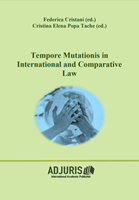Judicial Error in European Law
Judicial Error in European Law
Author(s): George Marius Mara
Subject(s): Human Rights and Humanitarian Law, EU-Legislation, Sociology of Law, Court case, Comparative Law
Published by: ADJURIS – International Academic Publisher
Keywords: miscarriage of justice; independence; judge; negligence; civil liability;
Summary/Abstract: Because judicial activity involves a certain amount of risk, being carried out by people, the possibility of miscarriages of justice subsists in any legal system. However, hypotheses of judicial error, which essentially involve non-compliance with procedural or substantive law rules with serious consequences for citizens' rights and freedoms, impose a positive obligation on the State to repair the damage thus caused, since the State is the guarantor of an act of justice governed by the principle of fair trial. Since the activity of judges must enjoy the guarantees deriving from the principle of judicial independence, a direct action against the magistrate responsible for exercising his office with gross negligence or bad faith is not admissible. However, a subsidiary action is regulated in many European legal systems, and the possibility of triggering disciplinary liability mechanisms against the guilty magistrate can be found in any legal system. The research methods used in order to achieve this aim are the comparative method, the analytic and historical methods.
Book: Tempore Mutationis in International and Comparative Law
- Page Range: 113-123
- Page Count: 11
- Publication Year: 2023
- Language: English
- Content File-PDF

